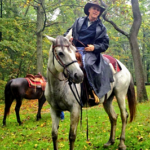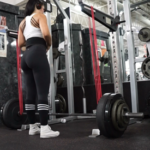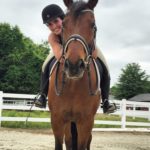
I’m not a morning person, but I am a horse person. For horses, I can get out of bed. Kimberly usually tackles the horse work during the week while I make breakfast or dinner. On the weekends, I can at least get up early and tend to the ponies before it’s time for the eggs and bacon to hit the pan.
I was a little tired but happy when I rose this past Saturday. I’d only gotten 5 hours of sleep, but it wasn’t because our 16-year-old dog, Kit, kept us awake. It was because we’d spent part of the early a.m. at our horsey neighbors’ house, helping them deliver a foal.
Actually, I should clarify. With many successful deliveries under their belts, Jack and Claudia are experts at delivering foals. They invited us over so we could see a little of what to expect when our Hanoverian mare, Mandy, delivers her foal in about 8 weeks.
Preparing for your first foal is tough because there’s nothing like it. That uniqueness defines much about the horsey lifestyle, not to mention the horses themselves. A great trail ride–there’s nothing like it. A great horse show–there’s nothing like it. And a foaling–there’s absolutely nothing like it either.
Jack and Claudia had warned us early Friday that their mare, Raben (pronounced like “Robin”), was two days past her due date and could deliver at any moment. Claudia cautioned that Raben might not foal until the middle of the night, but we asked her to call us no matter what time it was.
We were getting ready for bed just after 11 p.m. when the phone rang. We threw on whatever clothing was handy, stepped into our shoes and hopped in the car.
When we arrived at Jack and Claudia’s barn, the colt was most of the way out. His back legs were still inside Raben and his body was wrapped in the glistening tatters of the placenta. With one finger, Claudia tore the remainder of the thin membrane from the shivering colt’s torso and toweled it dry. It was amazing to see how fragile the placenta was, considering it had been the colt’s home for 11 months, withstanding his tossing, rolling and kicking.
Claudia grabbed another clean towel and dried the colt’s neck and head. He really seemed to enjoy that. I suppose some horses figure it’s never too early for affection. Raben hadn’t tried to rise yet, but she constantly cranked her head around to check on the colt. She nickered to him each time he moved.
Raben’s deep nickering was a soothing sound and unlike any noise I’ve heard a horse make. (And I’ve heard my share of horse noises.) It was a mix of “Thank goodness you’re out of my belly,” “You’re a mess; I must lick you clean” and “I love you, you little, uncoordinated stilt walker.”
Through his many unsuccessful attempts to rise, the colt had freed his legs and broken the umbilical cord. Jack helped the colt rise a few times and encouraged me to try helping the little guy stand up. I got him up on the first try, but the colt slipped free into a backwards summersault, bounced off the wall and landed on Raben. I felt horrible, like I’d kicked a puppy or pinched a baby bunny. I’d had only 30 seconds with the colt and already I’d nearly killed him.
“He’s fine,” Claudia assured me. “They’re made of rubber at this point.”
The colt, apparently preoccupied with the new surroundings and his uncooperative legs, seemed unaffected by his fall. And he sure enjoyed being petted. I found a good spot on his neck and started scratching. He closed his eyes, stretched his neck and wrinkled his tiny muzzle.
Jack and I continued trading off, helping the colt get up and then helping him stand. The colt seemed to be getting the hang of it. Now all we needed to do was to get Raben up so the colt could nurse.
With our help, the colt continued to practice getting up and standing. After about 10 times, however, he had to lie down for a nap. We laid him down in the corner and worked to get Raben to stand. She’d get her front legs out and try to push herself up, but couldn’t do it. After each attempt, Raben sighed loudly and rolled over on her side.
Moments later she’d sit up to look at her new baby and make another attempt. Each time Raben sat up, we piled straw behind her, and after several exhausting attempts she succeeded. We all applauded, which woke up the colt.
Jack and I took turns steadying him and aiming his mouth so he could nurse. Raben stood perfectly still for him with her back legs apart and slightly staggered. The colt sucked on Raben’s side, her thigh and her knee. The colt couldn’t seem to understand why he was still thirsty.
He was getting tired again, but we kept him standing and continued guiding his tiny mouth closer to Raben’s udder. I was holding the colt when he finally got a hold of the udder. Raben groaned as her sensitive, swollen udder finally found some relief. Then I groaned, too.? Except for an occasional kick, the colt had let his legs go limp, and I was now holding all of his weight. Raben and I groaned together. I suppose the colt couldn’t yet concentrate on nursing and standing.
Anyone who’s ever held a large foal up has a deep understanding of “dead weight.” And it’s not just dead weight; it’s dead weight that fights with you because it can’t control its limbs. And there’s no easy way to hold a spastically uncoordinated foal while avoiding both a bloody nose and a kick to the groin. Given the choice, I figured I should opt for the bloody nose. So, I secured my grip on the colt, cautiously stepped to his side and hunkered down to support him as he nursed.
My arms burned, but the colt just kept nursing. I locked my fingers beneath his belly and rested him on my left leg. I was determined to do all I could to ensure the colt got his fill of the essential colostrum. Soon, my leg started to burn, too. “Drink faster, little man,” I whispered, wearily wrapped around the colt with my forehead resting on Raben’s side. Raben must have picked up on my fatigue. She sympathetically switched from licking the colt to licking my right arm and shoulder. Horses can be good like that.
Soon the colt had drunk his fill, for the moment anyway. I handed him over to Jack as Raben circled around to grab a few bites of hay before returning to the colt’s side. Jack helped reposition the colt, who found the udder faster this time and continued drinking.
It wasn’t long before the colt was walking around the stall and nursing by himself. I know that horses have been doing this for thousands of years, but I think it’s an amazing thing. Now if human babies could run or jump around just two hours after they were born, the entire world would be plunged into complete chaos, but it works for the horses.
Kimberly and I drove home in near complete silence. Every so often one of us would quietly say, “That was crazy. That was so crazy.” Once in bed, it took no time for us to fall asleep, and we slept like foals.
After I tended to the horses on Saturday morning, I sat down at my desk. Because the new colt is a Swedish Warmblood and I speak Swedish (yes, I really do) Claudia and Jack had asked me for some good Swedish boy names beginning with “s.” I compiled a long list of appropriate names that would withstand being Anglicized, and I emailed it to them.
I was ecstatic when they picked one of my favorites: Stellan. It means “star.” Having witnessed his stellar entrance to this world, I thought it was a perfect pick.
I’m moved and invigorated every time I think about Stellan’s birth, and I hope Mandy’s foal makes an entrance that’s every bit as successful and touching. I also hope I don’t lose that excitement and energy–I still have an extra large foaling stall to build.
Jeremy Law and his wife, Kimberly, live on a small farm in North Carolina.
Read Jeremy’s other columns in EquiSearch.com’s Humor section, and share your comments in the forum.







